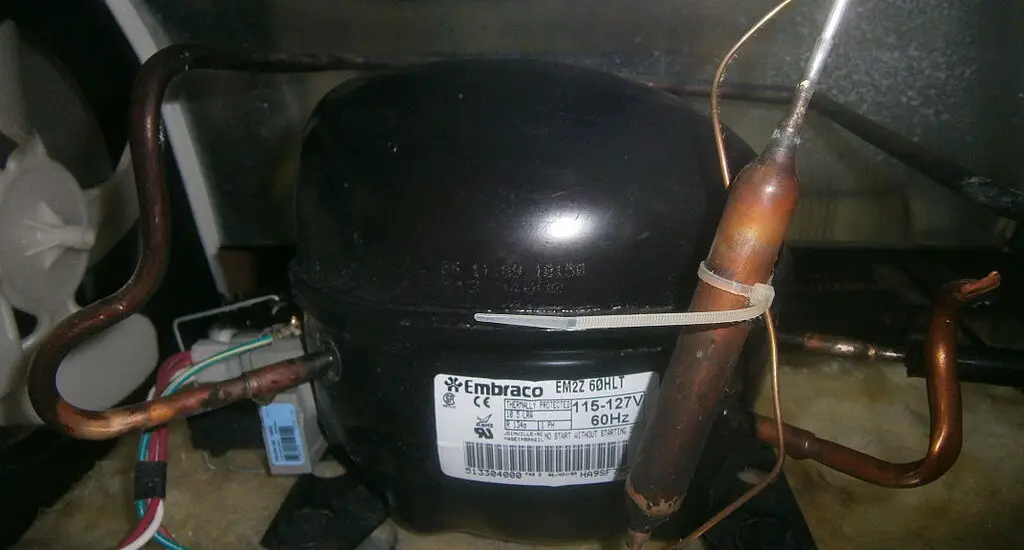Understanding what can damage a refrigerator compressor is crucial for anyone hoping to maintain their fridge’s longevity and performance. Delving into these threats, we aim to provide comprehensive information to keep your appliance in peak condition.

Table of Contents
Overloading the Refrigerator
A refrigerator, much like any appliance, has a capacity threshold. Overloading it means pushing its limits beyond design specifications. Here’s a deeper dive:
Impact on Air Circulation: Every refrigerator has vents that facilitate the flow of cold air. Overloading blocks these vents, preventing even cooling and causing the compressor to overwork. This could lead to certain sections of the fridge not getting enough cold air, potentially spoiling food.
Strain on Compressor: With more items inside, the compressor has to work harder to ensure everything is cooled. The increased workload leads to higher energy consumption and wear on the compressor.
Door Seal Damage: Overloaded items can press against the fridge door. This not only causes difficulty in closing the door but can damage the door seals, leading to air leakage and further inefficiency.
Regularly organizing and decluttering the fridge, and being conscious of its capacity can alleviate these issues.
Frequent Power Outages
Electrical interruptions, common in areas with unstable power supplies, are detrimental to refrigerators. Let’s break it down:
Voltage Fluctuations: Every time there’s a power cut followed by resumption, there can be a surge or dip in voltage. This irregular power flow can damage the delicate circuits inside the refrigerator, especially the compressor.
Compressor Stress: Frequently cutting and restoring power means the compressor has to stop and start repeatedly. This induces stress, decreasing its lifespan.
Temperature Inconsistency: Power outages can cause temperature fluctuations inside the fridge, potentially spoiling stored food.
A voltage stabilizer can regulate the power supply and safeguard your fridge from such inconsistencies. You can check out this Electronic Voltage Stabilizer listed on Amazon.
Dirty Condenser Coils
Condenser coils are crucial for the fridge’s cooling mechanism. Neglecting them can have several repercussions:
Heat Dissipation: When dust accumulates on these coils, it acts as an insulator, preventing them from releasing heat effectively. This forces the refrigerator to work harder to maintain the desired internal temperature.
Increased Energy Bills: A fridge struggling to cool efficiently will draw more power, reflecting on your monthly energy bills.
Reduced Lifespan: The additional strain caused by dirty coils can reduce the lifespan of both the coils and the compressor.
Regular maintenance, such as vacuuming the coils every few months, can prevent these issues.
Check out these other articles…
Does a Refrigerator Have 2 Compressors? Unveiling the Truth
Do Refrigerators Have Two Compressors? Comprehensive Answer
5 Types of Refrigerator Compressor: Essential Knowledge
How Do I Know What Size Compressor I Need for My Refrigerator?
What Happens When a Fridge Compressor Fails? 4 Signs & Fixes
Improper Ventilation
The location and surrounding environment of your fridge play a pivotal role in its operation. Why is proper ventilation so crucial?
Heat Build-up: A fridge releases heat through its back. If it’s placed too close to a wall or confined space, the heat gets trapped, causing the compressor to overheat.
Reduced Efficiency: Without proper ventilation, the fridge will struggle to maintain its internal temperature, leading to inefficiency and higher energy consumption.
Wear and Tear: Continual overheating can wear out the compressor and other critical components faster than usual.
Ensure there’s adequate space around your fridge, especially at its rear, to provide optimal ventilation.
Defective or Old Start Capacitor
The start capacitor is like the ignition for your refrigerator’s engine. When it’s compromised, the entire system suffers. Here’s a closer look:
Starting Difficulties: A faulty capacitor may struggle to provide the initial energy boost, causing the compressor to stutter or fail to start.
Increased Wear: Every failed start attempt puts strain on the compressor. Over time, these repeated strains can lead to permanent damage.
Noisy Operations: A struggling compressor can produce clicking or humming noises, indicating capacitor issues.
If you suspect a capacitor issue, consulting a technician promptly is paramount. A simple capacitor replacement can prevent more complex and costly repairs.